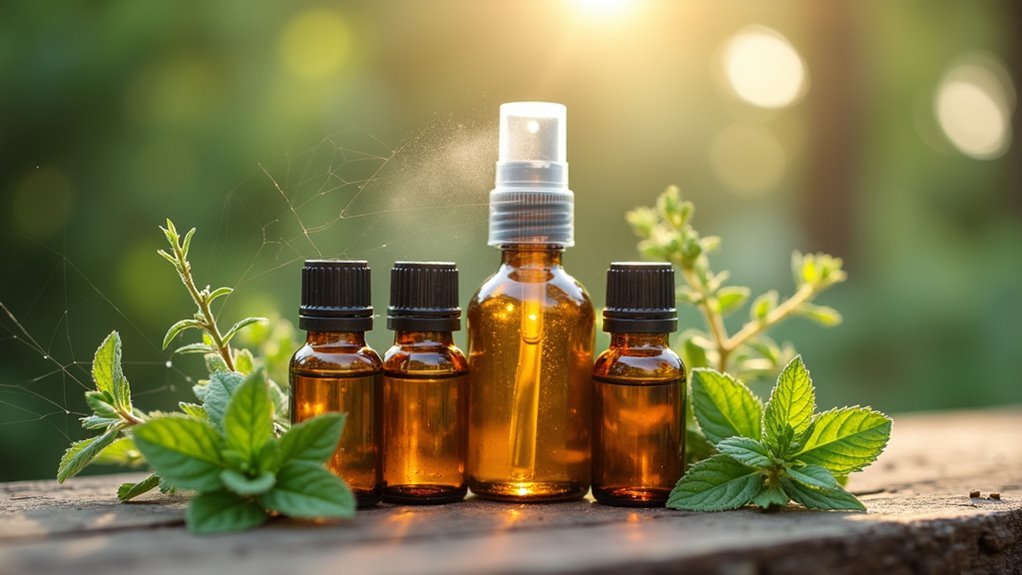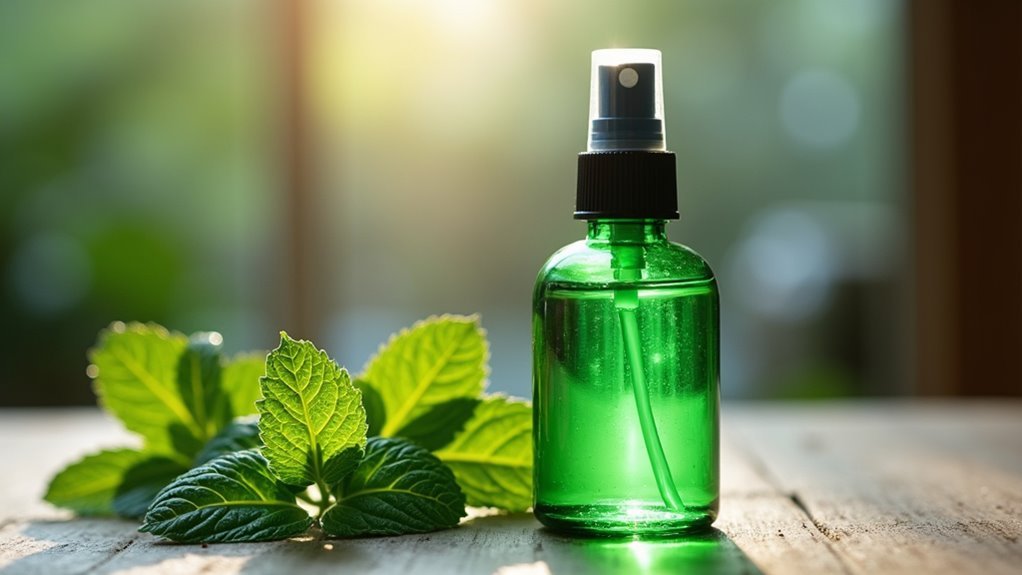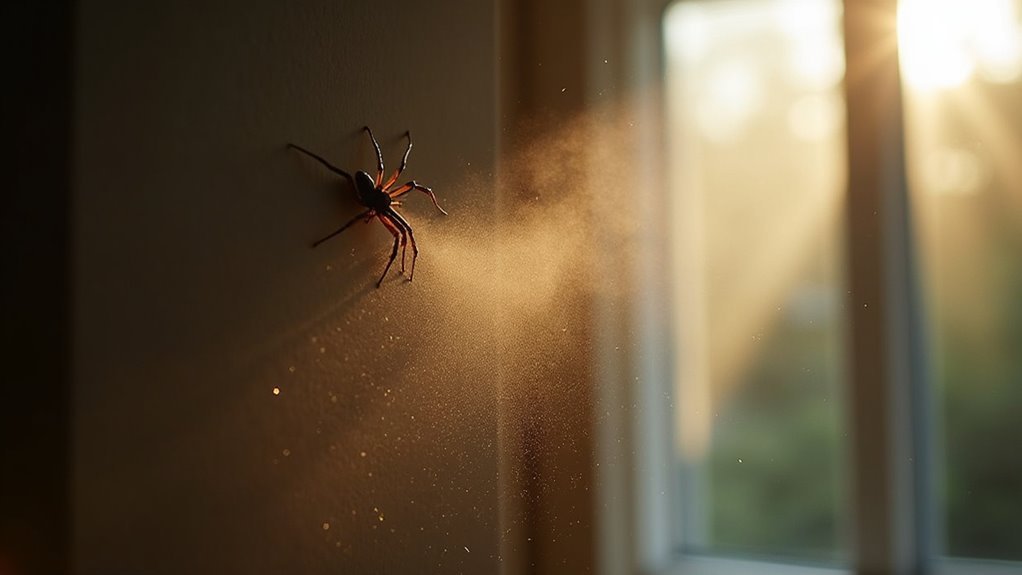You’ll find that peppermint oil-based corner sprays consistently prove most effective at keeping spiders away, with studies showing that spiders actively avoid areas treated with even small concentrations of this potent essential oil. Mix 10-15 drops of peppermint oil with one cup of water and a tablespoon of dish soap for better adhesion. Apply this solution to corners, baseboards, and entry points every few days, reapplying after cleaning. You can enhance effectiveness by combining multiple essential oils or exploring additional natural deterrent methods.
Understanding Why Spiders Avoid Certain Scents

While spiders rely heavily on their sensitive sensory receptors to navigate and hunt, strong scents from essential oils like peppermint, tea tree, and eucalyptus disrupt these abilities and make treated areas uninviting.
When you apply peppermint oil as a natural repellent, its potent aroma overwhelms spiders and interferes with their navigation systems. These essential oils work as effective control methods because they create an environment spiders actively avoid.
Chemical compounds in cedarwood oil also repel spiders, making it another valuable ingredient in natural pest control solutions.
You’ll find that regular application of these scented sprays creates lasting barriers to keep spiders away. The overwhelming fragrances from these natural repellents disrupt spiders’ sensory abilities, forcing them to seek more suitable environments elsewhere.
Essential Oil Combinations That Repel Spiders
Three powerful essential oil combinations can dramatically boost your spider repelling efforts beyond what single oils achieve alone.
Mix peppermint essential oil with tea tree oil and lavender for a potent natural spider repellent that targets multiple senses. This blend creates superior spider repellent formulations compared to individual oils.
Your second option combines eucalyptus oil with peppermint, delivering a pungent barrier that’s especially effective for corner applications.
The third combination pairs tea tree oil with eucalyptus oil, creating a versatile solution that repels pests that spiders feed on while targeting arachnids directly.
These essential oil combinations work exceptionally well for indoor applications, providing aromatherapy benefits while repelling spiders from entry points and hiding spots throughout your home.
DIY Peppermint Oil Corner Spray Recipe

You’ll need the right essential oil mixing ratios to create an effective peppermint spider repellent that actually works.
Getting the concentration perfect guarantees you’re not wasting oil while still maintaining potency against unwanted eight-legged visitors.
Proper application techniques and storage methods will help you maximize your homemade spray’s effectiveness and shelf life.
Essential Oil Mixing Ratios
Creating an effective peppermint oil corner spray requires precise measurements to achieve ideal spider-repelling results.
You’ll want to combine 10-15 drops of peppermint oil with one cup of water in your spray bottle for peak potency. This DIY peppermint oil mixture uses natural ingredients that effectively deter spiders without harsh chemicals.
For enhanced performance, consider these essential ratios:
- Basic Formula: 10-15 drops peppermint oil per cup of water
- Enhanced Formula: Add 1 tablespoon dish soap for better surface adhesion
- Application Rate: Reapply every few days or after cleaning
Target entry points and areas with spider activity for maximum effectiveness.
Remember to shake well before each use since oil and water naturally separate.
Your homemade spider repellent works best when stored properly in cool, dark locations to maintain the essential oil’s potency and guarantee lasting effective spider control.
Application and Storage Tips
When you’re ready to deploy your peppermint oil corner spray, focus on strategic placement for maximum spider deterrence. Apply the spray generously in spider-prone areas like corners, windowsills, and doorways where these pests typically enter or hide. Your spray bottle should deliver adequate coverage to create an effective pest control barrier.
For ideal results, you’ll need to reapply every few days since essential oils naturally lose potency over time. Store your homemade spray in a cool, dark location to preserve the peppermint oil’s effectiveness and prevent degradation.
Safety remains essential during application and storage. Always label your spray bottle clearly and keep it away from children and pets. This simple precaution guarantees everyone’s wellbeing while maintaining your spider control routine.
Vinegar-Based Spider Deterrent Formulas
You can create an effective spider deterrent using a simple vinegar-based formula that’s safe for your family and pets.
The basic recipe combines equal parts white vinegar and water, which you’ll spray directly into corners where spiders commonly gather.
This acidic solution disrupts spiders’ sensory receptors and proves remarkably effective at keeping them away from treated areas.
Basic Vinegar Spray Recipe
Anyone can prepare an effective spider deterrent using just two common household ingredients.
This natural vinegar spray will safely repel spiders from your indoor spaces without harsh chemicals. You’ll create a powerful solution that disrupts spiders’ sensory receptors while keeping your household safe.
Basic Vinegar Spray Instructions:
- Mix equal parts white vinegar and water in a clean spray bottle for ideal effectiveness.
- Apply directly to corners, windowsills, and doorways where spiders commonly enter or hide.
- Reapply weekly or after cleaning to maintain consistent spider deterrence in treated areas.
The acidic nature of vinegar makes environments uninviting for spiders while simultaneously cleaning surfaces.
This removes insect trails that could attract spiders, enhancing the spray’s deterrent properties for long-term protection.
Application Methods Corners
Since corners serve as primary hiding spots and travel routes for spiders, targeted application of your vinegar solution in these areas maximizes deterrent effectiveness.
Focus your white vinegar and water mixture on room corners, baseboards, and window frames where spiders commonly travel. For indoor and outdoor application methods, spray directly into crevices and along wall joints where entry points exist.
The solution disrupts spiders’ sensory receptors while removing insect trails that attract them, promoting cleanliness. You’ll need regular application every few days to control spiders effectively, especially after cleaning sessions.
These natural spider repellents work best when you consistently target the same areas to prevent spiders from establishing new pathways through your home.
Effectiveness Against Spiders
While vinegar-based spider deterrent formulas won’t eliminate existing spider infestations completely, they provide an effective, non-toxic method for discouraging new spiders from settling in your home. The acidic nature disrupts spiders’ sensory receptors, making treated areas less appealing for habitation.
Your vinegar and water solution offers several control advantages:
- Safe application – You can spray around children and pets without toxic concerns.
- Targeted coverage – Focus on spider-prone areas like corners and windowsills.
- Dual action – Eliminates insect trails that attract spiders while serving as repellent.
The effectiveness depends on consistent reapplication, especially after cleaning or moisture exposure.
While some prefer adding essential oil for enhanced potency, the basic vinegar formula provides reliable spider deterrence when used regularly throughout your home’s vulnerable areas.
Commercial Natural Spider Repellent Options
When you’re seeking effective spider control without harsh chemicals, commercial natural spider repellents offer proven solutions that combine convenience with safety.
Kates Home & Garden delivers a non-toxic peppermint oil formula providing effective spider deterrence with up to 1,500 sprays per bottle.
Cooper & Gracie’s organic multi-insect spray contains 100% food-grade essential oils that’s safe for use around kids and pets while targeting multiple pests.
Cooper & Gracie delivers family-safe pest control using pure food-grade essential oils that protect children and pets while eliminating multiple household insects.
For eco-conscious homeowners, Gardening Naturally creates barriers using oak tree extract and aloe vera without harming spiders.
SpiderSpray’s natural solution offers four hours of protection through biodegradable peppermint oil.
These spider repellent products utilize essential oils like tea tree and eucalyptus, delivering strong scents that effectively repel spiders while enhancing your home’s aromatherapy benefits.
Proper Application Techniques for Corner Treatments

Three key techniques guarantee your corner spray treatments deliver maximum spider-repelling power.
Use proper application techniques around windows and doors where spiders commonly enter your home. Clean areas where spiders hide before spraying to remove webs and dust that reduce adhesion.
Essential steps for effective spider control:
- Apply light, even coats – Avoid over-saturation which decreases effectiveness and creates drips.
- Target strategic locations – Focus on corners near baseboards, windows and doors where spiders shelter.
- Maintain regular schedules – Reapply every few weeks or after rain to keep spiders away consistently.
Ensure proper ventilation when using essential oil-based repellents indoors.
Your corner treatments will be most effective in keeping spiders out when you follow these systematic application methods for maximum protection.
Safety Considerations for Household Spider Sprays
Although proper application guarantees effectiveness, prioritizing safety considerations protects your family and pets from potential hazards associated with spider sprays.
You’ll need proper ventilation during application to prevent inhaling fumes that could cause respiratory irritation. Always read and follow label instructions carefully, paying attention to recommended application amounts and safety precautions.
Keep children and pets away from treated areas until household sprays completely dry, preventing exposure to chemical or strong natural ingredients. Securely store all products out of reach to avoid accidental ingestion.
Watch for allergic reactions to natural ingredients like peppermint oil, which can trigger headaches or discomfort in sensitive individuals.
How Often to Reapply Corner Spider Deterrents
Proper safety practices set the foundation for effective spider control, but maintaining that effectiveness requires strategic reapplication timing.
Natural sprays like peppermint oil need more frequent attention than commercial products, requiring reapplication every 1-2 weeks in high-traffic areas where spider activity is common.
Your reapplication schedule should consider these key factors:
- Product type – Natural sprays need renewal every 1-2 weeks, while commercial spider deterrents last up to 30 days.
- Environmental conditions – Moisture from rain or cleaning washes away effectiveness, requiring immediate reapplication.
- Spider activity levels – Monitor areas closely and adjust frequency based on ongoing spider populations.
Consistent maintenance prevents spider populations from rebounding quickly.
Indoor applications typically need renewal every 1-4 weeks, depending on scent strength and ongoing deterrence effectiveness.
Combining Corner Sprays With Other Prevention Methods
While corner sprays provide excellent localized protection, you’ll achieve superior spider control by integrating them into an extensive prevention strategy.
Combine peppermint oil-based corner sprays with diatomaceous earth for enhanced effectiveness—the spray handles repelling spiders while the powder prevents crossing treated areas.
Peppermint oil sprays and diatomaceous earth create a powerful dual-action barrier that both repels spiders and blocks their movement through treated zones.
Maintain clean indoor spaces by removing clutter, which eliminates hiding spots spiders prefer.
Focus on preventing entry by sealing entry points around windows and doors with caulk.
Repair torn screens and seal gaps to create physical barriers that complement your corner sprays.
Regular maintenance plays a vital role in long-term deterrence.
Vacuum corners weekly while removing webs to disrupt spider activity.
This multi-layered approach combining corner sprays with environmental modifications and consistent upkeep creates an inhospitable environment that effectively discourages spider infestations.
Frequently Asked Questions
How Do I Get Rid of Spiders in My Corner?
You’ll effectively eliminate corner spiders by spraying peppermint oil, regularly vacuuming webs, sealing wall cracks, sprinkling diatomaceous earth, and maintaining cleanliness. These methods create an uninviting environment that repels spiders naturally.
What Should I Spray to Keep Spiders Away?
You can spray peppermint oil mixed with water, white vinegar solutions, or commercial repellents containing cedarwood and essential oils. Apply consistently in corners and entry points since effectiveness diminishes over time.
What Is the Best Spider Repellent That Actually Works?
You’ll find peppermint oil works exceptionally well since spiders hate its strong scent. Kates Home & Garden Spider Repellent combines peppermint and cedarwood oils, providing effective natural protection for both indoor and outdoor spaces.
What Smell Do Spiders Absolutely Hate?
Spiders absolutely hate peppermint oil’s potent aroma. You’ll find they also despise tea tree, lavender, eucalyptus oils, vinegar’s sharp scent, and citrus smells like lemon that overwhelm their sensitive olfactory systems.
In Summary
You’ll find success keeping spiders away by choosing the right corner spray for your needs. Whether you’re mixing your own peppermint oil solution or buying a commercial repellent, consistency’s key. Apply your chosen spray every two weeks, focus on corners and entry points, and don’t forget to combine it with regular cleaning. You’ve got multiple effective options—pick what works best for your household and stick with it.





Leave a Reply